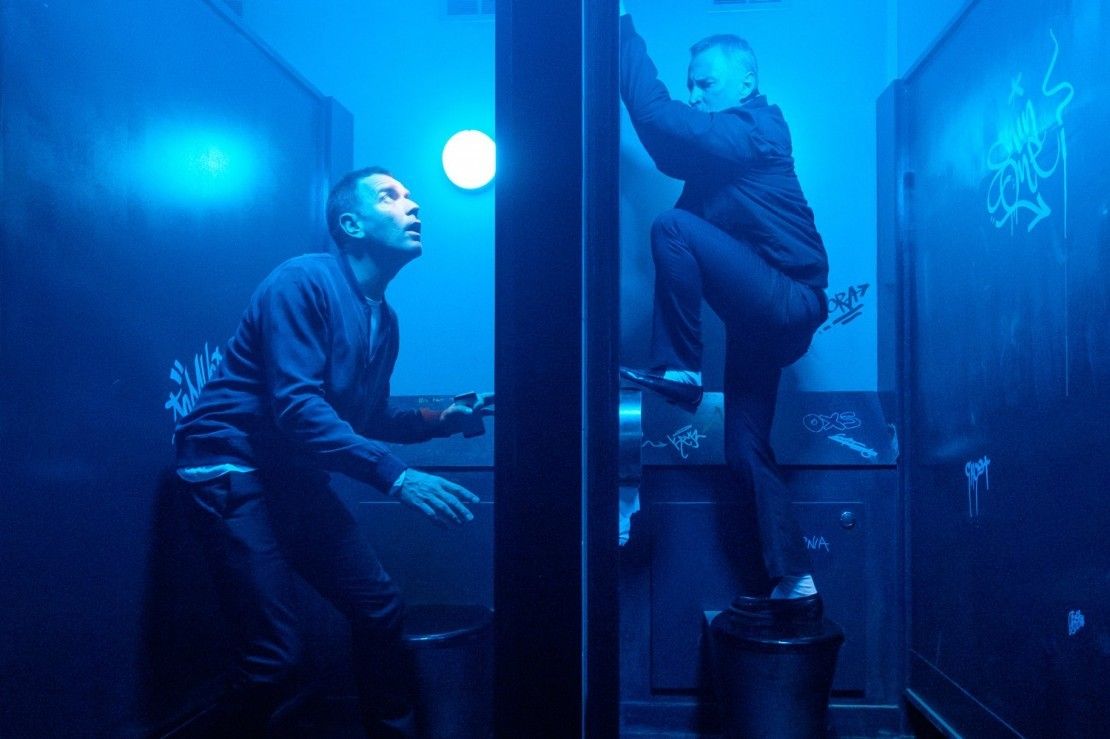
At SXSW, director Danny Boyle and Ewan McGregor joined Richard Linklater for a post-screening discussion to talk about the true meaning of the Trainspotting sequel.
To call Trainspotting a cult classic is a bit of an understatement. Danny Boyle's 1996 black comedy about a group of heroin addicts going through life in Edinburgh not only received critical acclaim after its premiere at Cannes, but it went on to become the highest box office earner of the year among limited releases largely due to its ability to tap into the angst of British youth subculture of the 90s, as well as its honest and horrific depiction of heroin addiction.
So, when word came out that Boyle was working on a sequel and that it would feature all of the characters that fans fell in love with the first time around, like Spud, Begbie, Sick Boy, and, of course, Mark Renton, the excitement was palpable.
Boyle joined his T2 Trainspottting star Ewan McGregor, as well as Richard Linklater, on stage after their SXSW secret screening to discuss the highly anticipated film, including its true meaning, the stunning beauty of shooting in Edinburgh, and how the life of a film shows up whether you intend for it to do so or not.
The pressure of giving a beloved film a sequel
Boyle was highly aware of the great expectation fans of Trainspotting had. He told the Q&A audience a story about a man who was watching him and his crew shoot the scene in which Spud falls out of a chair atop a high-rise in Edinburgh. "Eventually he shouted out to me, 'Danny! This better not be shite.'" The fear of disappointing fans was very real for Boyle, but instead of trying to use the original as a template or banking on its success to somehow legitimize the sequel, he decided to treat it like, what he calls, an "artifact."
The fear of disappointing fans was very real for Boyle. According to the director, a man who was watching him and his crew shoot a scene in Edinburgh shouted out, "Danny! This better not be shite."
Boyle explains, "You have to forget that fear because the other film is actually an artifact, something you can use. And what we did was we just drew threads from it occasionally to connect you back...like proudly in a way...so that we weren't like, fearful of it or ignoring it."
The true meaning of T2 Trainspotting
In the same way that Trainspotting isn't really about a group of friends struggling with addiction, T2 Trainspotting isn't really about one of those friends coming back after betraying the others 20 years prior. According to Boyle, the film is really about time, not just in terms of how much has passed since the original, but also how the characters changed as they grew older. It's a story about the transition from young adulthood to manhood, male aging, and everything that that entails.
"That contract of time, it's an extraordinary art form. There's nothing like it, I don't think."
As Boyle puts it, "They come out of their own childhood with their opinions, their freedom to be radicalists, crazy, and damaging to people around them without really caring. And then you get older, and what the new film's about, is realizing that time doesn't care about you. It's, kind of, male behavior over time...from boyhood to manhood."

How time connects filmmakers to their audience (and vice versa)
When asked to explain the visual "hiccups" in the film, the brief pauses or freeze frames, Boyle unleashed a poetic speech about how time is the thing that connects filmmakers to audiences and audiences to filmmakers: "What you do with movies is you just extend time or you contract it. That's the form. And you can also stop it and unlock it as well, after that. And it's a weird kind of union you have with the audience, because while cinema continues to exist, you also participate in time, because you give your time...we pay to give our time to a filmmaker and say, 'There. There's my time. What are you gonna do with it?' That contract of time, it's an extraordinary art form. There's nothing like it, I don't think."
For more, see our complete coverage of the 2017 SXSW Film Festival.

No Film School's coverage of the 2017 SXSW Film Festival is sponsored by Vimeo.
Your Comment
2 Comments
Thank you for this. Really enjoyed Danny's take on the use of time in cinema.
Its prompted me to think about filmmakers who might owe me some time ;-)
March 16, 2017 at 3:47PM
Unfortunately, it's a BIG SHITE. I think it's the worst sequel of film history. I had the occasion to watch 1 & 2 the same night in a big theatre. The first one is still amazing, so funny, full of ideas, with great characters.The new one... Hmmm... There's not one good idea in it. It could have been a great sequel, there was enough material. But no. It's not even a sequel but more a long commentary on the original film. They just talk about what happened in it. Like if nothing happened in 20 years. It feels like a man who try to give a second end to a film with an amazing end. It was one the first time in my life (and i'm not that young anymore) where I felt not only disappointed but also angry. Angry towards a filmmaker who did 2 of the best british films ever and then became a MTV copycat.
March 17, 2017 at 12:18AM, Edited March 17, 12:18AM